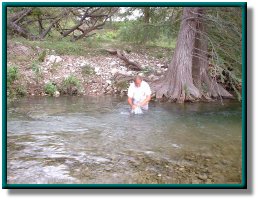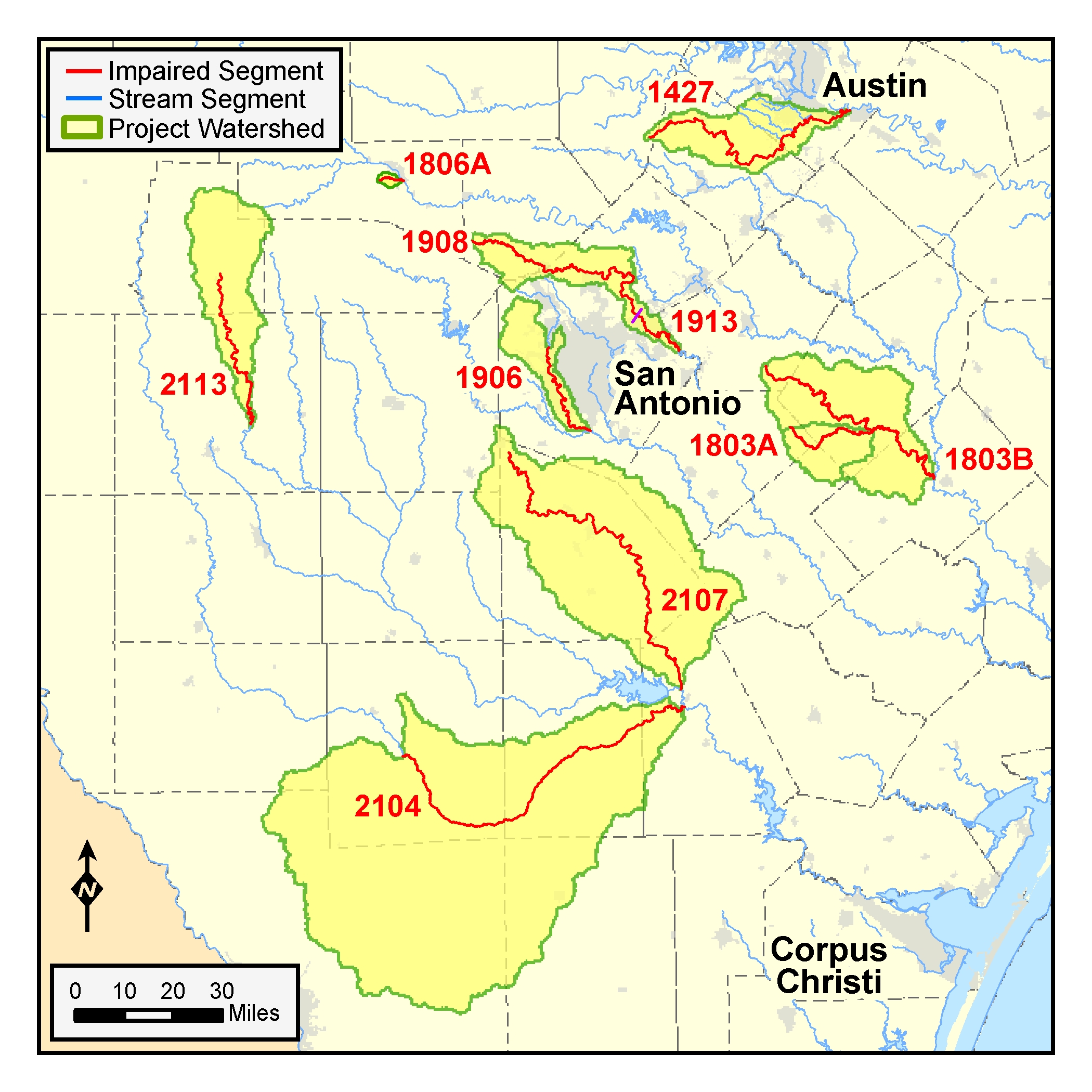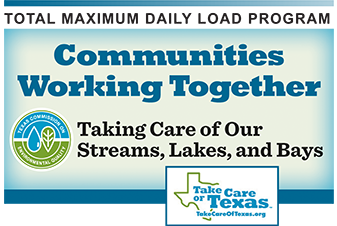South Central Texas Streams
Counties: Atascosa, Bandera, Bexar, Blanco, Comal, De Witt, Duval, Frio, Hays, Gonzales, Guadalupe, Karnes, Kendall, Kerr, La Salle, Live Oak, McMullen, Medina, Real, Travis, Uvalde, Webb, Wilson
Parameters: Bacteria, dissolved oxygen
Basins: Colorado River, Guadalupe River, Nueces River, San Antonio River
Segments: 1427, 1803A, 1803B, 1806A, 1815, 1906, 1908, 1913, 2104, 2107, 2113
On this page:
- Background
- Project Description
- Phase I–Overview, Documents, and Public Meetings
- Phase II–Strategy Development
- Contact Us
Background
The state of Texas requires that most streams, lakes, and bays be suitable for swimming, wading, fishing, a healthy aquatic environment, and use as a source of drinking water. These requirements may vary somewhat for specific bodies of water.
Oxygen gas, which dissolves in water, is essential for the survival of aquatic life. While the amount of dissolved oxygen in water fluctuates naturally, various human activities can cause unusually or chronically low dissolved oxygen levels, which may harm fish and other aquatic organisms.
Bacteria from human and animal waste may indicate the presence of disease-causing microorganisms, which pose a threat to public health. People who swim or wade in the creek or ingest contaminated shellfish may be at risk.
Project Description
In 2000, TCEQ water quality data showed elevated levels of fecal coliform bacteria and low concentrations of dissolved oxygen in 11 streams in south central Texas. In response to these conditions, the TCEQ Total Maximum Daily Load (TMDL) Program initiated a project to evaluate the extent and severity of low dissolved oxygen concentrations and high bacteria concentrations in the water bodies.
TCEQ contracted with a team headed by the Conrad Blucher Institute for Surveying and Science to study the affected streams, coordinate public involvement, and, if necessary, to develop TMDLs. Water quality monitoring began in the summer of 2002 and continued through August 2004.
In Phase 1 of the project, TCEQ carried out targeted monitoring to collect more data about the extent and severity of the impairments in the affected streams. Results of the data analysis for each water body and parameter pair are provided in the documents linked under Phase I below.
In Phase II, TCEQ carried out further assessment to determine appropriate management strategies for four of the streams—Elm Creek, Sandies Creek, the Atascosa River, and Mid Cibolo Creek. The remaining six segments were found to be meeting the dissolved oxygen and bacteria criteria in the Texas Surface Water Quality Standards in the Phase I analyses.
Phase I–Overview, Documents, and Public Meetings
Phase I consisted of targeted monitoring and assessment to determine the extent and severity of the impairments, and to further characterize water quality, in order to determine if TMDLs were needed for the project segments.
Phase I–Project Reports on Impairment Verification Monitoring
- Atascosa River, Segment 2107
- Final Report, Volume 1: Physical and Chemical Components
- Final Report, Volume 2: Biological and Habitat Components
- Camp Meeting Creek, Segment 1806A
- Final Report, Volume 1: Physical and Chemical Components
- Final Report, Volume 2: Biological and Habitat Components
- Cypress Creek, Segment 1815
- Final Report, Volume 1: Physical and Chemical Components
- Final Report, Volume 2: Biological and Habitat Components
- Elm Creek and Sandies Creek, Segments 1803A and 1803B
- Final Report, Volume 1: Physical and Chemical Components
- Final Report, Volume 2: Biological and Habitat Components
- Lower Leon Creek, Segment 1906
- Final Report, Volume 1: Physical and Chemical Components
- Final Report, Volume 2: Biological and Habitat Components
- Middle Cibolo Creek, Segment 1913
- Final Report, Volume 1: Physical and Chemical Components
- Final Report, Volume 2: Biological and Habitat Components
- Nueces River Above Frio River, Segment 2104
- Final Report, Volume 1: Physical and Chemical Components
- Final Report, Volume 2: Biological and Habitat Components
- Onion Creek, Segment 1427
- Final Report, Volume 1: Physical and Chemical Components
- Final Report, Volume 2: Biological and Habitat Components
- Upper Cibolo Creek, Segment 1908
- Final Report, Volume 1: Physical and Chemical Components
- Final Report, Volume 2: Biological and Habitat Components
- Upper Frio River, Segment 2113
Phase II–Strategy Development
Based on the analyses of Phase I data, the TMDL Team carried out further assessment to determine the most appropriate management strategy for four of the streams.
Contact Us
Please email tmdl@tceq.texas.gov, and mention the South Central Texas project in the subject line. Or call us at 512-239-6682.






 Back to top
Back to top